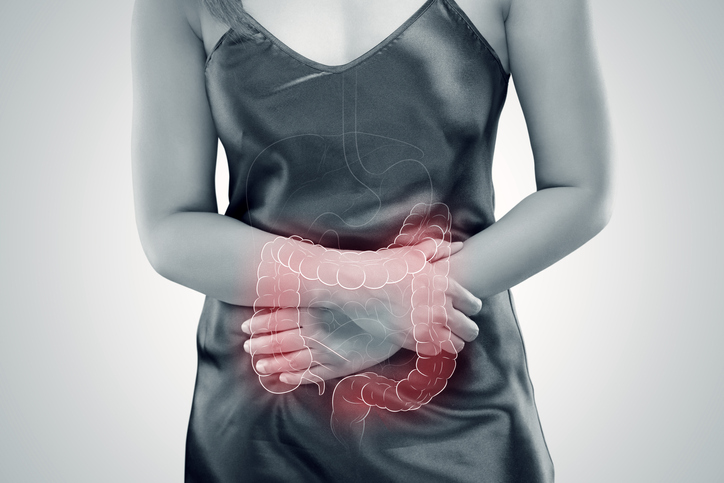Ulcerative colitis a type of inflammatory bowel disease. An inflammation of the intestines that can cause considerable pain. Patients can suffer from cramping and abdominal pain For most patients, the pain could either last long, or fade as the inflammation lessons. Ulcerative colitis is also known as Crohn’s disease or inflammatory bowel disease (IBD). This is different from the condition known as IBS (Inflammatory bowel syndrome) which is not associated with ulcers or other bowel damage.
 Causes of IBD
Causes of IBD
Inflammatory bowel disease (IBD) or ulcerative colitis occurs when the immune system attempts to fight off invading viruses, or bacteria. The result is an abnormal immune response which causes the immune system to attack its own cells.
When this happens in the digestive tract, it causes ulcerative colitis. A question we are asked as physicians is if ulcerative colitis could be hereditary.
The treatment of ulcerative colitis or IBD
The treatment of ulcerative colitis has improved in the past few years. IBD (Irritable Bowel Disease) or ulcerative colitis and its many complications can be treated using either medication or surgery when required. This disease is not generally life-threatening. The majority of those suffering with Crohn’s disease or ulcerative colitis, will never develop colorectal cancer. It is highly treatable when it is found early. This is why we suggest testing for this disease regularly.
Treatment may involve drug therapy and could involve surgery as well. Patients usually react well to anti-inflammatory drugs. This is normally the first step to treatment. But seeing your gastroenterologist on a regular basis and following the treatment he suggests usually will keep your symptoms under control as long as the disease is not severe.
As you visit your doctor make sure you are not shy about sharing your symptoms and flare-ups that you struggle with daily. Remember, your physician cannot help you with the challenges if you don’t share this with him or her. They can guide you to make better choices and suggest medications which will help you live with the pain of ulcerative colitis.
When are flare-ups common in women?
Ulcerative colitis is known to flare-up between periods. It can also cause frequent and urgent bowel movements, bloody stools, diarrhea and abdominal pain. It is important to take medications as prescribed only. An effective treatment plan to manage your flare-ups is needed to manage this disease.
Changing your diet to control ulcerative colitis symptoms:
 Spending time with a nutritionist is a day of a good decision for all of those suffering from ulcerative colitis or IBD. Every patient should focus on a healthy diet. Your nutritionist will develop a perfect eating plan and they will also determine if you need additional vitamins or mineral supplements.
Spending time with a nutritionist is a day of a good decision for all of those suffering from ulcerative colitis or IBD. Every patient should focus on a healthy diet. Your nutritionist will develop a perfect eating plan and they will also determine if you need additional vitamins or mineral supplements.
Avoid foods such as dairy products, if you are lactose intolerant. Stay clear of dried beans, legumes and peas. Avoid dried fruits, and foods that contain sulfur or sulfate. High fiber foods can also trigger colitis symptoms.
Avoid drinking alcohol and caffeine to keep flare-ups to a minimum. Broccoli is another veggie that could aggravate the symptoms of colitis. This is because these foods are very difficult to break down in the digestive system. Popcorn is another food that is not easy for the body to break down and can cause pain for those with this disease.
Determining if you have ulcerative colitis
Before diagnosing ulcerative colitis, your physician will rule out other possible causes of your pain or symptoms. He may request that you take a blood test, which could search for any signs of anemia and infection. He may ask for a stool sample to check for white blood cells. If they are present in your stool, it could point to ulcerative colitis.
Further, he may even ask you to schedule a colonoscopy, which is an examination of the entire colon. If polyps are found during the colonoscopy, the doctor will remove those polyps and send these specimens to the lab to look for abnormal tissue which could point to cancer. Having a colonoscopy is not just for checking for ulcerative colitis. It also gives the patient a huge advantage in finding any cancer early enough to save your life. All seniors should have at least one colonoscopy every five years.
If you have severe symptoms that point to ulcerative colitis or any other gastroenterology disease, please contact your physician immediately. The physician may ask to x-ray your abdominal area to rule out ulcerative colitis. The x-ray can also rule out a perforated colon.
Another test which the physician may order is called a CT scan. This test can determine if your colon is inflamed. An inflamed color is a red flag for gastroenterologists.
Find Relief
If you’ve been dealing with digestive issues or acid reflux, or overdue for your colon cancer screening, now is the time to contact Gastroenterology Consultants of Central Florida. It just takes a quick and easy check up to catch and treat an issue. Preventative screening and testing help detect diseases and conditions in their early and most treatable stages. For more information or to make an appointment, contact Gastroenterology Consultants of Central Florida.
